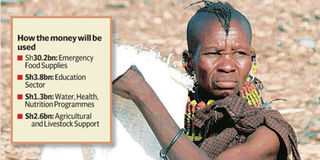Sh37bn plea to save victims of famine

What you need to know:
- Post-election chaos, drought and global economy blamed for national food crisis
The massive task facing the Government as it tries to save 10 million Kenyans from starvation was laid bare on Friday when President Kibaki declared the food shortage a national emergency.
It will require Sh37 billion, more than the amount set aside for the ministry of Nairobi Metropolitan and nine other ministries, to buy and distribute food and provide education and medical care for the most vulnerable, said President Kibaki.
He appealed for international assistance amounting to Sh32 billion.
Extreme desperation
And as President Kibaki, Vice President Kalonzo Musyoka, Prime Minister Raila Odinga and a number of Cabinet ministers were launching the appeal in Nairobi, reports from the countryside told of misery and extreme desperation as families struggled to find food.
Families in Machakos, Makuyu, Makueni, Pokot, Tana River, Kwale, Kilifi, Turkana, and the slums of Nairobi and Mombasa reported struggling to get food.
“The last time it rained was on November 15 last year and it was just a light rain,” says Mr Patrick Mwai Mwande, a chief in Makuyu said.
Forestry officers in Kericho declared a fire alert due to the drought.
In Nairobi, the top government officials were joined by foreign diplomats, representatives of the donor community, scholars and NGOs in making the appeal.
And as they gathered at Nairobi’s Kenyatta International Conference Centre, light showers pounded Nairobi and other parts of the country.
The rains offered a ray of hope, not only because it was the first drizzle since the year started, but because severe drought has been the major cause of the famine.
Even those who spoke at the meeting welcomed the rains as God’s blessings for Kenya.
However, the Government, President Kibaki said, had only managed to set aside Sh5.2 billion for the emergency kitty.
“I am therefore appealing to all our friends and development partners to assist us in meeting the shortfall of Sh32 billion that will be needed to ensure the needs of 10 million Kenyans are met until the end of August this year,” said the Head of State.
He further directed all arms of the Government to marshal available resources to respond to the situation.
President Kibaki said the Sh37 billion would go to help in several areas.
At least Sh30.2 billion will be required for emergency food, while another 3.8 billion will be for the education sector.
Learning institutions have not been spared by the famine, with some schools having to raise levies to buy food.
In other areas, especially those in arid and semi arid regions, some institutions are under the school feeding programme, which is equally affected by the drought.
President Kibaki said Sh1.3 billion would be used on water, health and nutritional programmes.
“We shall also need Sh2.6 billion to be used in the agriculture and livestock interventions,” he added.
The Government had made arrangements to import seven million bags of maize at an estimated cost of Sh17 billion, added the President.
The maize will be sold to lower and stabilise food prices.
As a medium term intervention, President Kibaki said the Government would make available about 93,000 tonnes of fertiliser at affordable prices.
“We will also reduce the price of seed by 10 per cent,” he added.
The Government would also make arrangements to provide affordable ploughing services in rural areas, he said.
Forest fires
But most parts of the country have remained dry. Areas such as Kericho and Kipkelion in the Rift Valley Province, which are known to be agriculturally productive are so dry that the forestry department has declared a fire season.
Fires constantly break out in the forests there.
The problem has even led the forester in charge of the two district, Mr Caleb Manyala, to recall some officers and guards who are on their annual leave.
Prolonged droughts is the main cause of the current famine as President Kibaki observed in his written speech.
“The primary cause of the famine is severe drought as we had poor rain season in the last two years,” he said.
Post-election violence last year has also played a big part, with some farmers in the North Rift — the country’s breadbasket — could not plant crops after they were displaced from their farms.
Nevertheless, members of the diplomatic corps who expressed commitments their governments were making to help Kenya survive the famine, did not fail to criticise the President and his team for corruption taking place in the country.
For instance, the illegal export of maize by middlemen to Sudan was also blamed for the maize shortage.
“These cases of corruption must be contained and they should also be investigated,” said US Ambassador to Kenya, Michael Ranneberger.
However, he said his country was prepared to help Kenya overcome the crisis.
Other envoys echoed his sentiments, saying the Government must be prepared to fight corruption.
In response, President Kibaki said: “You will see some people in court soon.”
He said he would not tolerate actions of some officials, and “unscrupulous traders who seek to manipulate the food supply chain for their own benefit.”
Mr Odinga who is the chairman of the Cabinet Food Security Committee said the necessary mechanisms were also being put in place to seal loopholes that may be used by a few unscrupulous people to create artificial shortages.
Some donors pledged food aid worth million of shillings while others said they would scale up their assistance as soon as they complete drought assessment.
Already China has pledged $3 million (Sh234)food aid and Japan Sh3 billion, among others.




